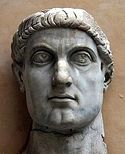

| Previous day | Next day |
| Old Style
May 21
|
Wednesday |
New Style
June 3
|
|
7th Week after Pascha.
Tone 6.
Fast Day. |
Fish, wine and oil allowed.
|
![]() Meeting of the Vladimir Icon of the Most Holy Theotokos (1521).
Meeting of the Vladimir Icon of the Most Holy Theotokos (1521). ![]() Holy Equals-to-the-Apostles Emperor Constantine (337)
Holy Equals-to-the-Apostles Emperor Constantine (337) ![]() and Helen, his mother (327).
and Helen, his mother (327). ![]() St. Constantine (Yaroslav) (1129).
St. Constantine (Yaroslav) (1129). ![]() and his children Sts. Michael and Theodore, wonderworkers of Murom (12th c.). Uncovering of the relics of St. Andrew Ogorodnikov, fool-for-Christ, of Simbirsk (1998).
and his children Sts. Michael and Theodore, wonderworkers of Murom (12th c.). Uncovering of the relics of St. Andrew Ogorodnikov, fool-for-Christ, of Simbirsk (1998).
St. Cassian the Greek, monk, of Uglich (1504). Synaxis of the Saints of Simbirsk and Karelia. Synaxis of the New Hieromartyrs and Confessors of Ufa. St. Cyril, bishop of Rostov (1262). St. Basil, bishop of Ryazan (1295). Monk-martyr Agapitus, founder of Markushev Monastery (Vologda) (1584).
Hieromartyr Secundus and those with him, in Alexandria (356). St. Hospicius of Trier (581). St. Helen of Decani, Serbia (ca. 1350).
Repose of Elena Pavlova of Chepel, Kharkov (1885) and Elder Isaac of Dionysiou Monastery, Mt. Athos (1932).
Thoughts for Each Day of the Year
According to the Daily Church Readings from the Word of God
By St. Theophan the Recluse

Wednesday. [Acts 23:1–11; John 16:15–23]
The Lord says to the holy apostles before His sufferings: A little while, and ye shall not see me: and again, a little while, and ye shall see me (John 16:16). The Lord’s sufferings and death so struck the holy apostles that the eyes of their mind became dim, and they no longer saw the Lord as the Lord The light was hidden, and they sat in a bitter and wearisome darkness. The light of Christ’s resurrection dispersed this darkness—and they again saw the Lord. Thus the Lord Himself explained His words: ye shall weep, He said, and lament, but the world shall rejoice; and ye shall be sorrowful, but your sorrow shall be turned into joy (John 16:20). It is said that every soul on the way to perfection experiences a similar defeat. Universal darkness covers it, and it does not know where to go; but the Lord comes, and changes its sorrow into joy. It is truly as necessary as it is for a woman to suffer before a man be born of her into the world. Can’t we conclude from this that he who has not experienced this has not yet given birth to a real Christian within himself?
Articles
 Meeting of the Vladimir Icon of the Mother of God in memory of the Saving of Moscow from the Invasion of Khan Achmed |





